Now more than ever, it's important to invest in professional networking and building your personal professional brand. You might be worried by economic uncertainty, looking for a new role, or just looking to progress your existing career. Building an effective network and a strong personal brand brings new opportunities and serendipitous connections.
But how can you network when you're pushed for time, looking to connect with people in other places or just short on opportunities and invitations? Networking online is the obvious solution and here we explan how to get the most out of Guild, a messaging platform for professional groups, networks and communities.
Don't rely on LinkedIn alone
With around 1 billion members worldwide, LinkedIn is generall seen as the professional network online. So you really have to be there and you should make sure your profile is up to date.
However, LinkedIn's popularity is also its weakness. This study highlights the changing nature of LinkedIn from 'professional network' to 'marketing / recruitment platform'. It has become very noisy and many users complain of being sold to all the time. In particular, this loss of quality has meant that the most senior professionals often avoid, or ignore, LinkedIn. The focus is on sales and recruitment. Groups are rarely engaged.
Seek out specialist groups on other platforms
LinkedIn is big but it can be hard to cut through. So seek out special interest groups and niche communities that fit your professional interests on other platforms. There are still some popular web forums out there and you can find focused and well-run professional communities on Slack, Reddit, Twitter, Facebook and others.
To find these you can just search Google, search the platforms themselves, read articles with relevant suggestions, and ask your professional peers for recommendations.
Why you should join Guild
Guild has a number of unique advantages that make it worth investing time in for high-quality professional networking and personal brand building:
- You can reach senior professionals on Guild - because Guild has no ads, focuses on privacy and security, is consent-based, easy to use and mobile, it attracts senior professionals. 17% of Guild users are CEOs or C-Suite executives and 10% are founders or owners of the business. The largest single audience segment by seniority are ‘senior management’ at 31% of total Guild users. See details in Where do the C-Suite network with each other?
- Community networking cuts through where email/social don't - Guild is a community platform. It's as easy to use as WhatsApp but focused on professionals. This means that messages get through whereas email gets ignored, intercepted by PAs, routed to junk etc. Social media can be very noisy and your messages get lost amongst the noise and saturated feeds. Guild's messaging is personal and intimate.
- Respectful professional behaviour and high integrity environment - Guild is all about quality and privacy. There are no ads and you can't pay to get access to other people like with LinkedIn and others. The Guild Charter, which all members must adhere to, protects high standards of professional behaviour. Everyone has a profile so cannot hide behind secrecy or anonymity. If you want to project your own brand as high quality and want to network with others who care about the best professional standards, then Guild is for you.
- Unique features designed for professionals not consumers - the likes of WhatsApp are designed for personal use. Indeed it is not legal, and highly risky, to use WhatsApp for professional purposes. But Guild is dedicated to business and messaging between professionals so there are features optimised for that e.g. professional profiles, archive search, make an introduction, mark messages as unread/read, send messages to yourself as email, threaded conversations, pin/feature threads, build a professional network of connections etc.
- Guild is established yet comparatively 'undiscovered'. You've got a great chance of building a strong network over time and members are super-responsive. Guild is new, innovative and exciting and not yet too big, bland and saturated.
- For further product comparisons see 18 things you can do on Guild that you can’t with WhatsApp and Guild vs LinkedIn: which is better? and Slack isn't designed for communities and here's why
Following are the steps you should follow to get the most out of Guild:
Step 1: Fill out your full profile on Guild
[note this handy article: Getting started with Guild: building the perfect Guild profile]
Once you've joined Guild, whether invited in, or by registering yourself via the website or app, you should go to the Profile section and fill out your profile. As well as your photo, your name, title and organisation, consider these fields:
- Your professional bio - short summary of what you do and have done. Feel free to sell your expertise and achievements.
- I'd like help with... - when another member looks at your profile this is your chance to let them know how they might help you. Obviously if you're looking for a new role then say so!
- A career highlight - use this to highlight an impressive achievement and/or bring a more human and emotional side to your profile. Show others what you care about.
- Links - go ahead and link to your LinkedIn profile, your website, articles you've written, your blog, your social media accounts etc. This is your chance for others to go deeper and learn much more about you.
- Make your profile discoverable - your Guild profile is private by default but you can choose to make it discoverable meaning that you'll be listed on the Guild directory and search engines can index your profile, helping to build your personal brand.
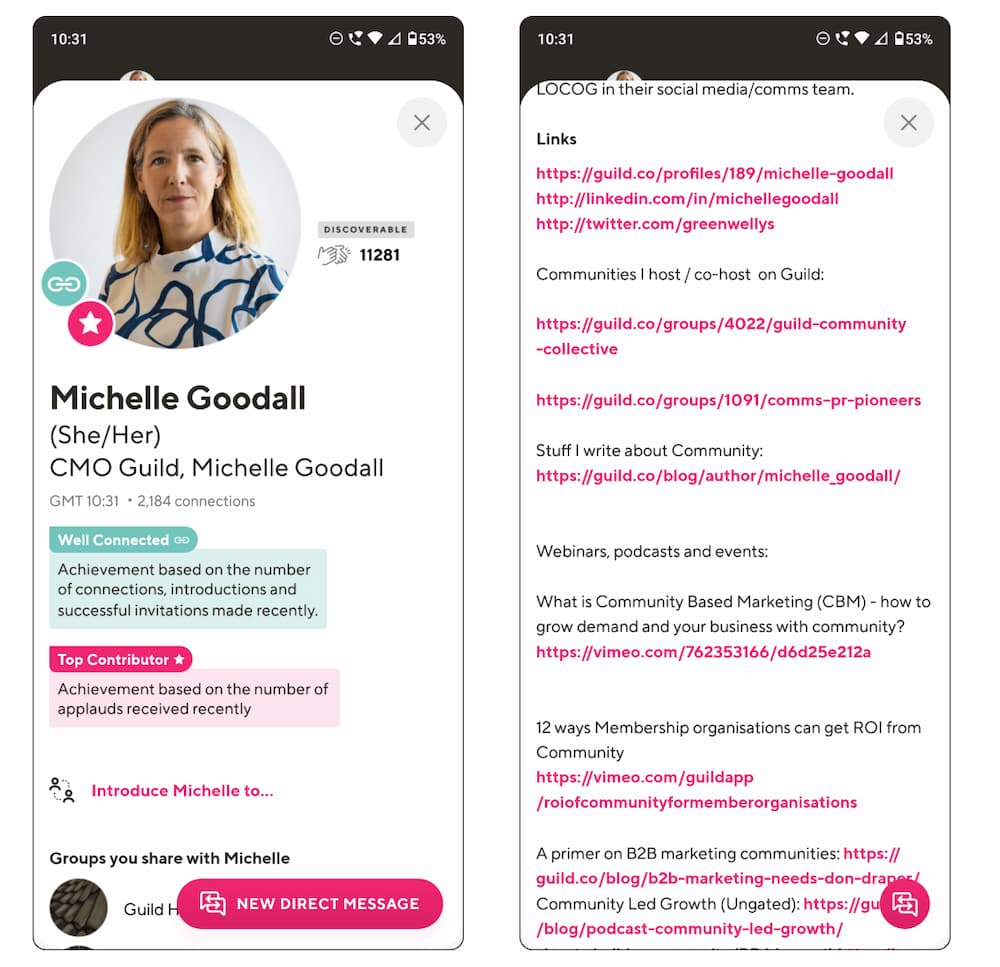
Step 2: Build your network of connections
The connections in your Network consist of those you share groups with plus any individuals you connect to directly.
There is a section of the app called 'Network' where you can see, and search, all your connections as well as add new ones by invitation. You can also remove connections here which means they can no longer direct message you.
If you no longer want to hear from someone but you don't want to remove them from your network, click on their profile picture and use the block function.
You do not want your network to be so big that you cannot maintain quality, or it gets too noisy, or you don't really know or care about those you are connected to. But you need enough connections to be effective at professional networking and to raise your profile and awareness with the right people. For more on the science behind group and network sizes check out our Model for Professional Networking in the Digital Age.
There are three ways to build your network of connections:
1. Invite your personal professional contacts into your network
Just tap/click 'Add Connections' in the 'Network' section of the app and you can access your phone contacts to send connection requests by email or SMS (text message). Or you can create an invite link that you post to another group, or put on a web page, or send out in an email, make part of your email signature etc. Or you can just sent an invite to a particular name/email address.
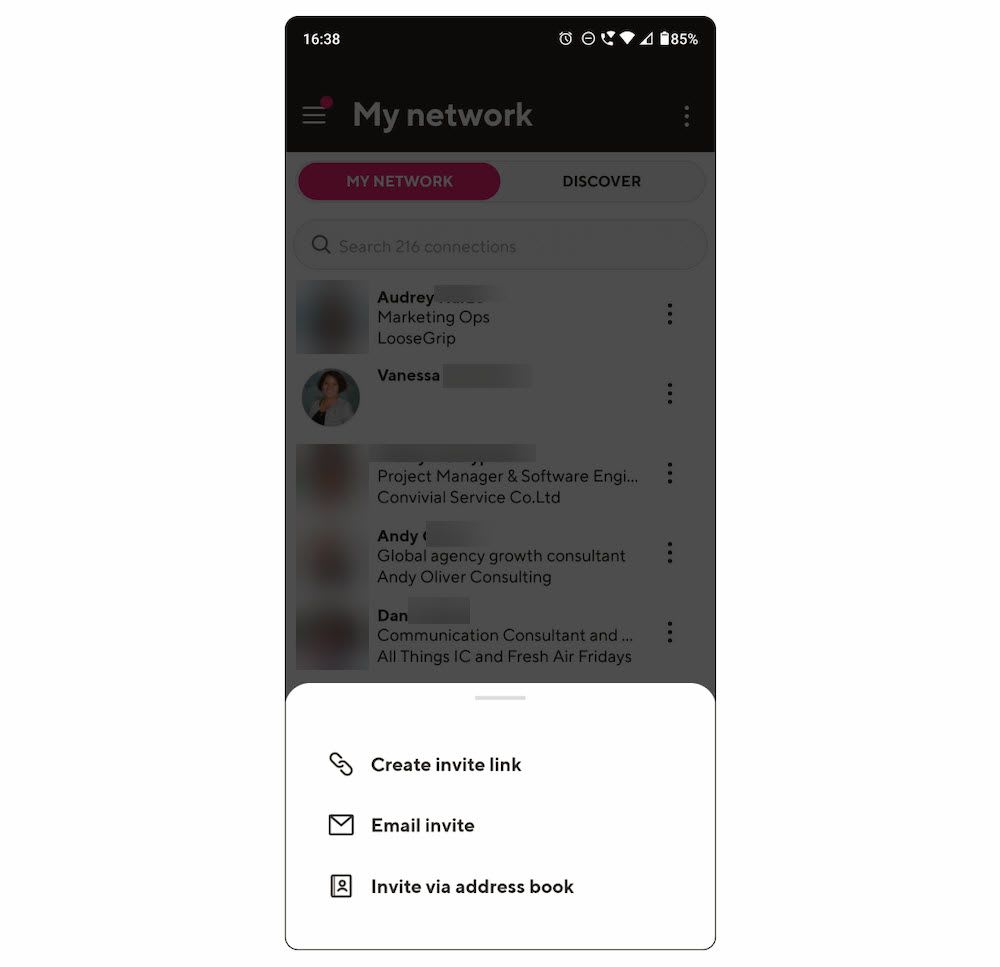
2. Join an existing Group
Most groups, networks and communities on Guild are private and invitation-only. You will only know about them if you are invited in by the host. However, there are an increasing number who accept new members and they make their group discoverable. You can browse these discoverable groups online or within the app.
3. Create your own new Group
If you're up for it, definitely the best way to network is to actually put yourself at the centre of things and run your own group(s). This could be very informal, a group of your best contacts or former colleagues helping each other out, or you could use the group to share your expertise and contacts as a form of thought leadership to build your profile and open up opportunities. If you have a newsletter, then you should definitely run a Guild group!
Guild is free to use for for a basic group and you only pay if you want additional support, service and custom features. We provide plenty of advice and guides on how to make your group a success. For example, read these guides:
- Get off to a great start with your Guild group(s)
- 36+ ways to create engagement in your Guild group(s)
To create your own group(s) just go to the Groups section of the app, click/tap 'New Group', give your account a name (if you haven't already), and then name your new group.
Step 3: Get noticed in the right way
You've optimised your profile, you're building your network of connections, but you still need to be noticed. You want others looking at your profile in order to maximise your own opportunities. Here's what we recommend on Guild:
- Engage with conversations - even reading group messages is a good start as all group participants can see who has read any message. But ideally you should contribute, whether creating a new conversation or replying to an existing thread. You can even just share a relevant and useful link. Or ask for advice / help. At first you might feel a bit apprehensive, but typically once you've posted once or twice then you'll feel at ease!
- Create reciprocity / goodwill - if you help others, or show appreciation, then they are more likely to help you when you ask a question or ask for a favour. You can applaud their messages to signal agreement or gratitude, you can reply to a message and thank them for it in the group, you can answer their questions in as helpful a way as you can, you can introduce them to another of your connections who might be valuable for them etc.
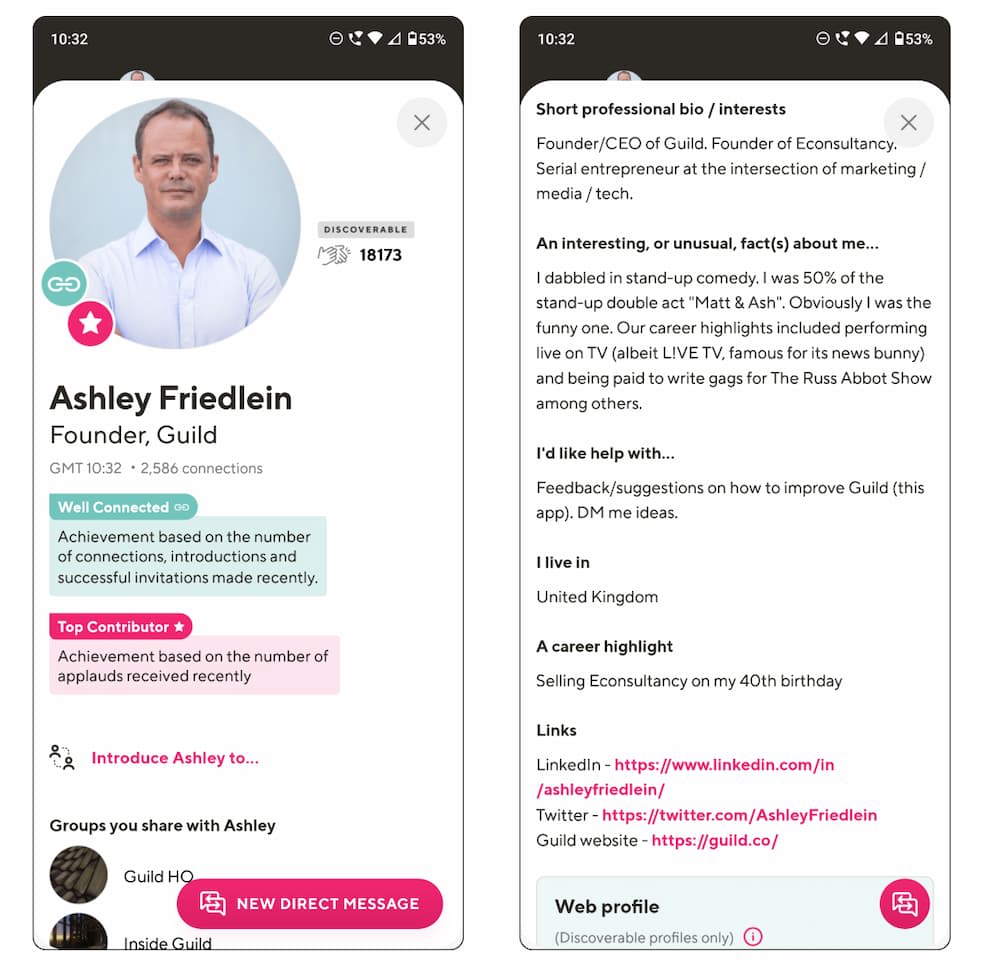
- Get personal with Direct Messages - posting to a group gets you wider visibility, depending on the size of the group, but direct messages are more personal and you can be more specific.
You can DM any other member that you share a group with. You can reply privately via DM to a group message which is a nice way to get in touch with the author personally. You can DM new joiners to your group to say hi and welcome them to the group. You can search your Network not just on name but it also searches job title and organisation so you may well find there are people in your network worth DM-ing.
It's a great idea to request to connect with someone that you want to DM, but you can also message them directly from any group member list or by creating a new Direct Message and searching for them.
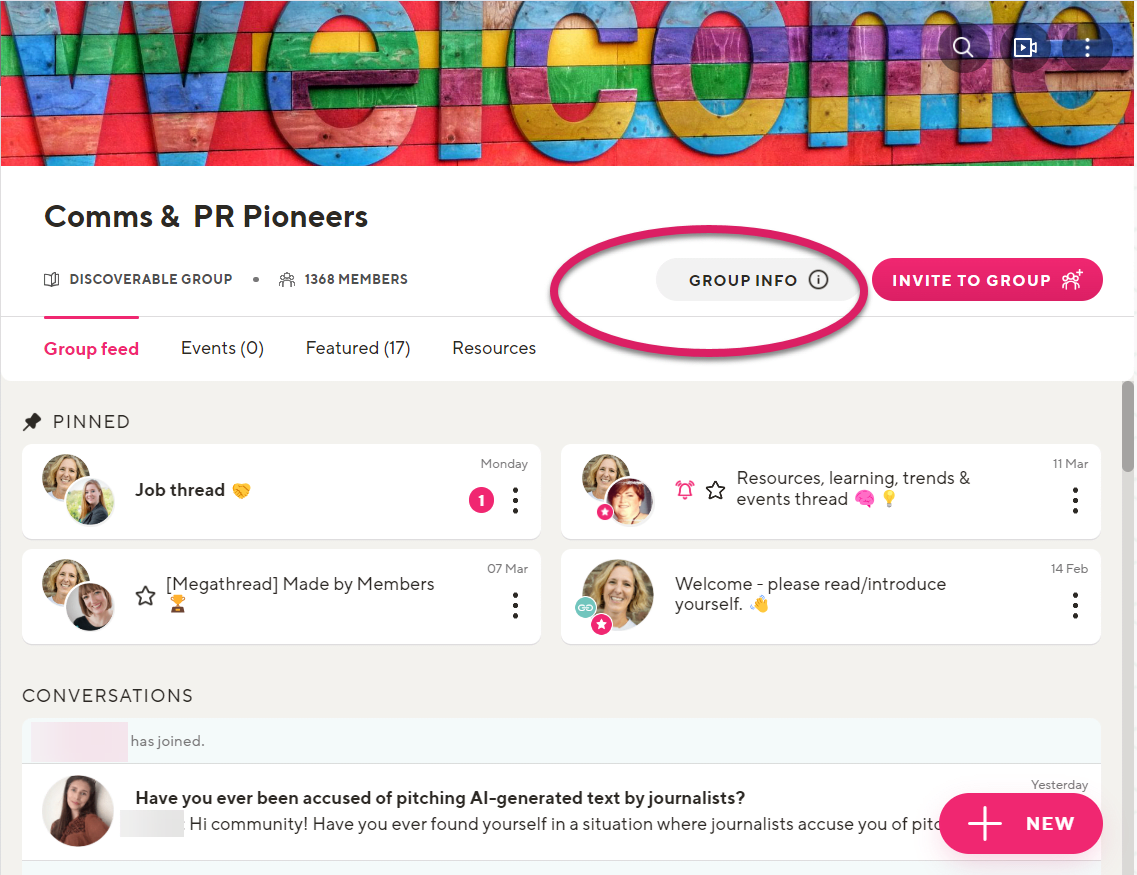
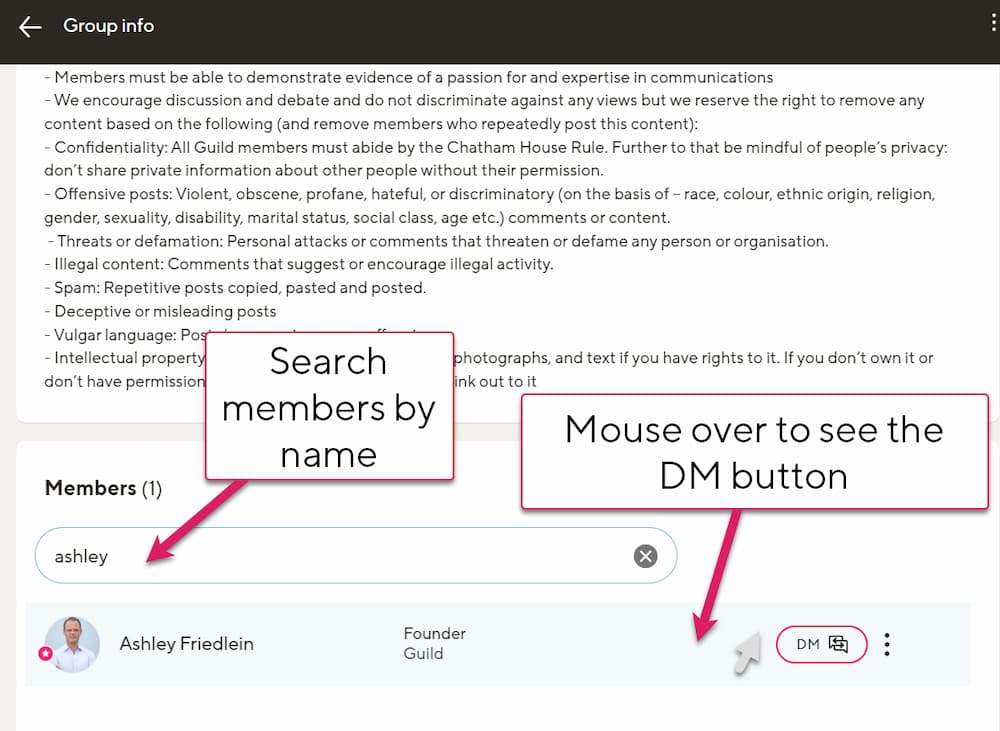
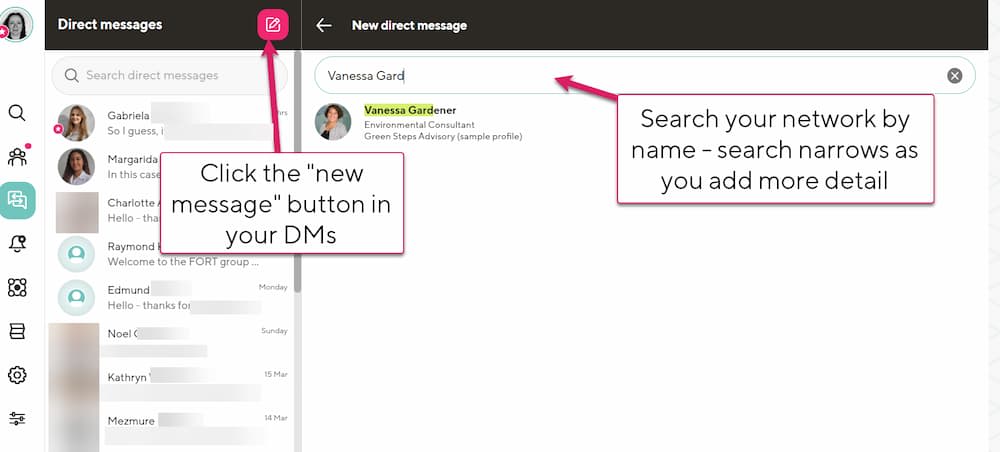
Step 4: Keep at it
Building trust and relationships takes time. Showcasing your expertise through thought leadership might get you some 'quick wins' but usually you do need to invest in building goodwill and your reputation.
The good news is that it is not a big investment of time. What is important is consistency not volume or quantity. In fact, we've done analysis on Guild and found that if you post too often, or in big flurries of activity, then you actually put people off and reduce the likelihood of positive engagement. It's much better to do a little but often. 1o minutes a day to check in and perhaps post something a couple of times a week is plenty.
More about using Guild for professional networking
Our guide to the benefits of being a community participant
10 tips for being a brilliant community member
How to grow your professional network on Guild
Using networking apps to connect with people who can help guide your career
Six Guild communities that can help your career
Join Guild 🤝
See for yourself how the Guild experience is different to WhatsApp, Slack, LinkedIn or Facebook Groups.
Guild is a safe space to connect, communicate and collaborate with others.
Join us on a platform that is purpose-built for creating groups, communities and networks on mobile.
- Just want to join some groups? Simply join Guild and then look through the discoverable groups and communities to find relevant ones to join
- Thinking of running your own community? With an elegant and simple to use, mobile-first UX you’ve got everything you need to start a community - custom branding, analytics, group and user management and support. Get started with your own community here with our free and paid options
Contact us if you want to know more or have any questions.